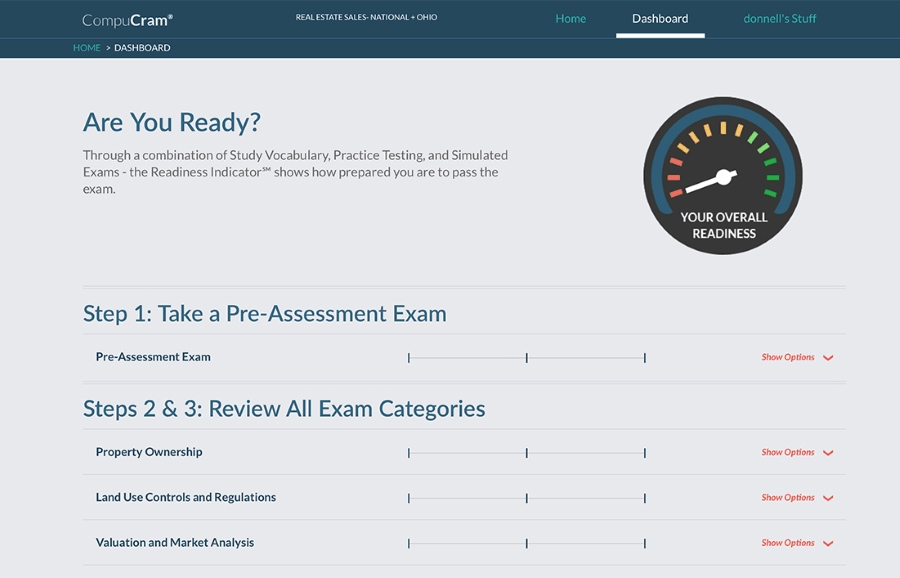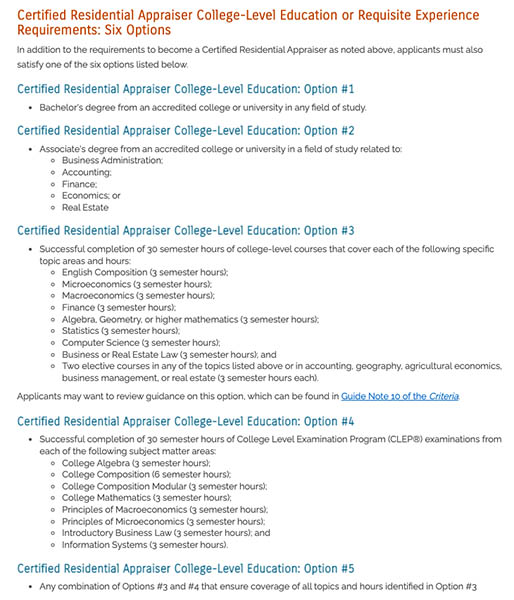A real estate appraiser estimates the market value of residential and commercial properties. Learning how to become a real estate appraiser includes choosing the right type of appraisal career, completing coursework, passing an exam, and completing field hours with supervision. To make it easy, we’ve organized this step-by-step guide to show you how to become an appraiser.
As you learn how to become a real estate appraiser, make sure you choose your resources wisely. McKissock Learning is an approved education provider with courses to help you get your appraisal license, complete continuing education (CE) hours, and upgrade your license. It also provides additional resources to help your career, like exam prep, livestreamed classes, instructor support, professional development, and one-on-one career sessions.
1. Complete Required Coursework to Become a Trainee
Learning how to be a property appraiser can be somewhat confusing since state requirements vary. However, in every U.S. state, the requirements to be a real estate appraiser start with becoming a real estate appraisal trainee. Do this by completing and passing the required coursework. The Appraiser Qualifications Board (AQB) sets national course requirements, but some states require additional coursework.
Did you know? There are a variety of career options within the appraisal field. This guide is focused on how to become a land appraiser, also known as a real property appraiser. However, there are other types of appraisers, which include:
- Appraiser assistant
- Personal property appraiser
- Business valuation analyst
- Mass appraiser
Here’s an overview of the national and state-specific requirements to become a licensed real estate appraiser:
National
To become an appraisal trainee, the AQB requires you to complete a total of 75 credit hours of educational content from an approved provider. The required core curriculum coursework, which cannot be substituted by experience, is broken out as follows:
- Basic Appraisal Principles (30 hours): This course introduces aspiring appraisers to basic real property concepts, legal considerations, real estate finance, economic principles, and appraisal ethics.
- Basic Appraisal Procedures (30 hours): The procedures course teaches students about the actual valuation process, including the three traditional approaches to value—a cost approach, a sales comparison approach, and an income approach—and how to collect data, describe the subject property, and communicate appraisal results.
- National Uniform Standards of Professional Appraisal Practice (USPAP) (15 hours): The USPAP 15-hour course sets forth industry requirements for ethical behavior and competent performance as described in the USPAP.
State
In addition to the national course requirements, some states require additional classroom time to learn how to become a home appraiser. The 15-hour USPAP trainee class is still required, as well as additional state-specific requirements.
Here’s a quick breakdown of what it takes to be a real estate appraiser in each state:
If you feel overwhelmed about completing 75 hours of education or more, choose your education provider wisely. The right schools will provide various course options and engaging course material. Some schools offer individual courses so you can complete your hours bit by bit, but bundled classes are typically more cost-efficient. Choosing the best training school for your needs will show you how to get into real estate appraisal and how to establish a successful career.
Here are a few of the best online real estate appraiser training schools:
School |  |  |  |
|---|---|---|---|
Best For | Aspiring and existing appraisers wanting education for every stage of their career | Future appraisers wanting a self-paced online education | Aspiring and current appraisers wanting an organization that offers education and support |
Key Features |
|
|
|
Starting Price | $225 | $570 | $688 |
Learn More |
While the coursework to become a residential real estate appraiser is an upfront expense, it is worth noting that licensed real estate appraisers made an average base salary of $64,048, although the range was between $34,414 and $119,199, according to Indeed. On the other hand, Glassdoor estimated the average salary for appraisers was $104,748. Investing in the right education will set you up for the best success and the highest income.
2. Tackle Appraiser Fieldwork Experience Hours
After becoming an appraiser trainee, you must start working under the mentorship of a licensed real estate appraiser. Before moving on to the next level of appraiser licensing, the national requirements state you must complete a minimum of 1,000 hours of supervised work within six months. In addition, some states require up to 2,500 hours of supervised work in order to become a real estate assessor.
Here’s a breakdown of the required number of supervised hours you need to become a housing appraiser in each state:
Getting a position as a real estate appraisal trainee can be challenging, but you may be able to find jobs at residential appraisal firms and banks. These organizations generally have the greatest need for real estate appraisal services. Look at job boards through the American Society of Appraisers or Indeed. The most important thing is to make sure you work under a certified appraiser and keep track of your hours.
3. Pass Your State’s Appraiser Licensing Exam
Once you’ve fulfilled your state’s required hours of supervision, the next step to becoming an appraiser is passing the national exam. The Licensed Residential exam consists of 110 questions and must be completed within a four-hour period. Depending on your state and location, your exam will be administered by one of these approved exam providers:
Search each website to find the real estate appraiser exam schedule in your area. There will be an exam fee at the time of registration, which will range in price from about $950 to $2,710, depending on your state and the type of exam.
Make sure you read the candidate handbook for details about when to arrive, what to bring, how to prepare, and how the exam will work. For example, the National Appraiser Examination Candidate Handbook includes information about required state-specific materials, eligibility requirements, making reservations, and exam procedures.

CompuCram Readiness Indicator (Source: CompuCram)
The national first-time pass rate for the Licensed Residential Appraiser exam was 62% in 2022. It’s unlikely you’ll pass your exam without serious effort and focus on learning the material. To maximize your ability to pass the exam the first time, use CompuCram’s Real Estate Appraisal Exam Prep course. You’ll get a money-back pass guarantee, six months of access, and interactive study tools to give you full confidence on test day.
4. Submit Your Licensed Residential Appraiser Application
In general, passing the real estate appraiser exam is the final requirement when learning how to become an appraiser. After you’ve met all the qualifications, you must submit a license application to your state’s regulatory board. State application requirements vary, but generally include background information, evidence of course completion, employment history, and an experience report.
Once your license is approved, you can begin working as a real estate appraiser with limitations on what types of property you can appraise. As a licensed residential appraiser, you can only appraise non-complex, one- to four-unit residential properties worth less than $1 million and complex, one- to four-unit residential properties worth less than $400,000.
For a review of your state’s requirements as well as the application documents needed to apply for a real estate appraiser license/certification, choose your state from the drop-down:
Appraiser Licensing Requirements by State
5. Find Work as a Licensed Real Estate Appraiser
With your license in hand, it’s time to learn how to be a real estate appraiser on your own. Search for job openings online or consult your network for openings. In the first few years of your career, you’ll likely work for a bank or private appraisal company. According to the Bureau of Labor Statistics (BLS), employment for real estate appraisers is expected to continue growing by 4% over the next 10 years.

Real estate appraiser resources from the NAR (Source: NAR)
To appraise real estate accurately, you’ll need a few key tools, like access to the multiple listing service (MLS). The MLS provides property sale details needed to research closed and current properties for sale. What you need to be a real estate appraiser depends on the firm you work with, your location, and your goals. For example, some appraisal firms may cover the cost of NAR (National Association of Realtors), which provides access to the MLS as well as many other tools and resources.
6. Upgrade Your License
After learning how to be an appraiser and working for a few years, consider upgrading your license for a wider variety of opportunities. There are two primary types of real estate appraiser license upgrades: Certified Residential Appraiser and Certified General Appraiser.
Certified residential appraisers can appraise larger, more valuable residential properties than licensed appraisers. General appraisers, on the other hand, can appraise all types of properties and typically focus on commercial buildings. Consider upgrading your license if you want to expand your business to more valuable residential properties or commercial properties.
Did you know? When upgrading your license, keep in mind some states require appraiser trainees to complete final preparatory coursework or degree programs, such as an associate degree or college-level courses. Even if this is not a national requirement from the AQB, some states ask for additional coursework. For example, New York requires certified residential appraiser applicants to have a bachelor’s degree or associate degree in a related field of study.
The main benefit of upgrading your license to be a certified residential appraiser is that you can appraise properties valued at over $1 million. To do so, you’ll have to meet national and state requirements for appraisal coursework, experience, and college-level education. Once certified, your expertise will be more in demand because many banks prefer to work with certified residential appraisers than licensed residential appraisers.
To become a certified residential appraiser, meet the following additional requirements:
- Coursework: Certified residential appraisers are required to complete 200-plus hours of AQB-approved appraisal coursework, including previous coursework.
- Experience: Certified residential appraisers must have at least 1,500 hours of experience working as an appraiser or appraisal trainee in no less than 12 months.
- Education: Certified residential appraisers must have a bachelor’s degree, an associate degree, or complete 30 hours of college-level courses, or a combination thereof as summarized by The Appraisal Foundation. Contact your state’s agency to see how they are adopting new standards and what is required of you to meet them.
As a certified residential appraiser, you can appraise one- to four-unit residential buildings of any complexity or value. You may also appraise vacant or unimproved land that is utilized or best suited for one to four residential units. To appraise vacant or unimproved land suited for more than four residential units, you’ll need additional certifications.

Education requirements for certified residential appraisers (Source: Appraisal Foundation)
The most advanced type of real estate appraiser license is a certified general appraiser.
Appraisal professionals can also become certified general appraisers. As a certified general appraiser, there are no limitations on the type of real property you can appraise, including land, residential properties, and commercial properties. However, most certified general appraisers focus on commercial properties and rarely appraise residential homes.
If you’re evaluating how you can become a real estate appraiser at this level, start by looking at the required education. The AQB requires the following:
- Minimum of 300 hours of qualifying education
- Bachelor’s degree from an accredited color or university
- 3,000 hours of non-residential fieldwork within 18 months
Pro tip: If you want a career in real estate without needing a college degree, consider being a sales agent or broker. Start by learning how to become a real estate agent.
Bottom Line
Learning how to become a real estate appraiser is a somewhat straightforward process, but it requires a significant amount of time, effort, and hours of practice. However, once you know how to become an appraiser, it can be a lucrative career with great income potential.